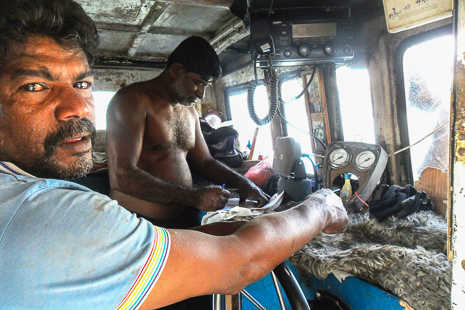
Fisherman Esli Nimal Fernando, background, has struggled after the European Union imposed import bans on fish from Sri Lanka. (Photo by Asanka Fernando)
A month at sea earns Esli Nimal Fernando and his crew roughly US$200 each, not nearly enough to support their families.
“We struggle with life and death at sea, but once we land we struggle to sell our fish for a reasonable price,” Fernando, 55, a father of three, told ucanews.com on the dock in Chilaw, a port town in western Sri Lanka.
Now, deep-sea fishermen here are feeling the effects of a European Union ban on fish caught by Sri Lankan-flagged vessels. The European Union began enforcing the ban in January after blacklisting Sri Lanka for failing to combat illegal fishing.
Sri Lanka, which exported a significant amount of tuna and swordfish to EU countries, has suffered a loss in revenue of US$75 million since January, a government spokesman said in late July.
Hardest hit are Sri Lanka’s fishermen themselves — three-quarters of whom are Catholic, according to local advocates.
The European Union accuses Sri Lanka of allowing ships to fish the Indian Ocean without marine satellite equipment, making it difficult to track their movements, according to media reports.
However, Fr S.N. Shelton Dias says it was larger foreign-owned boats using sophisticated equipment that were violating EU rules, not Sri-Lanka’s fishermen, who often rely on small boats with old-fashioned nets.
“The ban was in effect not because of the activities of our fishermen. They know strategies to fish while protecting the ecosystem,” Fr Dias told ucanews.com. “It is because of foreign ships that were fishing illegally with advanced equipment. This piqued the interest of the European Union to bring this sanction.”

Fishermen load ice before they set out to sea. About 75 percent of the fishermen in Sri Lanka are Catholic and work with small-sized boats and old-fashioned nets. (Photo by Asanka Fernando)
Ripple effect
W.A. Sunil Fernando, president of the fisherman's cooperative in Chilaw, said fishermen didn't know about the ban until a few months before it went into effect, leaving them an inadequate amount of time to lobby the government or to defend themselves.
He said a protest held in front of the government's Fisheries Department last October was greeted by locked gates. Employees of the department then “hurled stones” at the protesters, injuring a few, he said.
“We were worried about the way we were treated by the ministry. More importantly, it would take us too long to find and develop another international market,” he said. In the meantime, the fishermen needed to be able to make a living, he said.
The fishing boats provide jobs for about 26,000 families. However, the network of satellite jobs needed to service the industry — the security guards, net weavers, ice suppliers — doubles that figure. When industry profits are down, the ripples are felt across the region.
Jacob Fernando, 70, spends his days at the docks in Chilaw, repairing damaged fishing nets. The job helps him support his wife, two daughters and granddaughter.
“I'm too old to work as a traditional fisherman, but my family still needs my help. I work all day weaving nets for the fishing boats. For this I earn [US$50] a month,” he said.
Prime Minister Ranil Wickramasinghe said he expects the country to be in compliance with EU regulations by the end of 2015. The government is installing monitoring equipment in 1,500 boats free of charge. It also is establishing a center to track the movements of ships that have the monitoring device installed.
Even though the EU ban has brought hardship to Sri Lankan fishing communities, some still hope the end result will bring positive changes.
The ban drew praise from environmental groups, noting that the restrictions also would prohibit EU fishing vessels from working in Sri Lankan waters, the Associated Press reported.
Rogus Fernando, who is on a waiting list to receive the monitoring equipment, said he hoped the changes will allow fishermen to ply their trade in Indian Ocean waters without any uncertainty.
“Earlier there were foreign ships engaged in fishing in our territory, using highly advanced nets, but after the sanction was in effect, the ships are no longer there,” he said.


